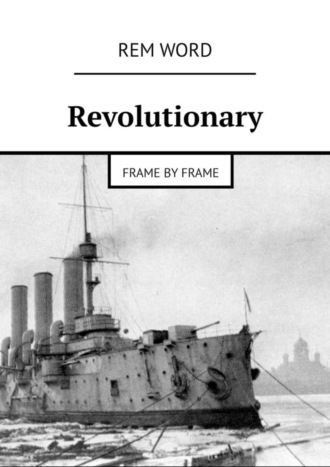
Полная версия
Revolutionary. Frame by frame

Nikolay Romanov, at the age of twenty, the future emperor of the Russian land. His favorite occupation is quite up to, probably a mature age – playing hide and seek with royal relatives. According to the characteristics of S. Witte “An insignificant, and therefore insensitive emperor. Loud phrases, honesty and generosity exist only for show, so to speak, for the royal exits, and within the soul is petty cunning, childish cunning, fearful deceit.” General Wrangel, the last head of the White Army: “The king had neither precisely defined vices, nor clearly defined qualities. He was indifferent. He did not love anyone or anyone.” The post of the leader of a nation, the emperor, the tsar is not so much a central element of the organization as an example for general imitation. Consciously, or unconsciously, society adopts the subtlest features of the image of a ruler. Russia at the beginning of the twentieth century is a fairly well-established technical state. But there is an acute lack of living water of love and understanding in it. When the level of this life-giving fluid reaches a critical lower point, people no longer sympathize with each other. The fire of war of all against all breaks out

Putilov defense plant, St. Petersburg, the beginning of the twentieth century. Employees of defense enterprises earn up to 160 rubles a month, with an average salary in the country of 27 rubles. The length of the working day at state-owned enterprises is 12 hours, for a private trader, depending on his ideas about humanism, 12—16 hours. The pay of librarians, primary school teachers is 20 rubles, qualified mechanics, turners 50, doctors 80, officers, depending on rank, 80—500, governors 1,000 rubles. Military spending, reaching 30% of the budget, exsanguinates the country. They also become a source of a real internal threat. The price for renting a modest room is 3—5 rubles per month. Lunch, pancakes with caviar in a tavern, to the dump – 1 ruble, 0.5 liters of vodka 15—17 kopecks, potatoes 5 kopecks. kg., loaf of bread 4 kopecks., beef 25 kopecks, cheese 70 kopecks, black caviar 3 rubles 20 kopecks per kilogram. You can live. A cow, a horse, depending on the success of bargaining 40—80 rubles. Further, a shirt is 3 rubles, men’s boots are 7 rubles, a short fur coat is 15 rubles. If you want to attract beautiful women and live luxuriously: the accordion 7.50 p., Gramophone 20—40, a car without bells and whistles 2000 rubles. A chic Russian “Russo-Balt” series K (1909, see photos on the web) will cost the reader traveling by time with the power of thought 5,500 rubles. However, even a very well-to-do young worker, no matter what songs he sang, the chance to win favor with a noblewoman tends to zero

Be that as it may, the Russian Empire produces its steam locomotives, various railway equipment, warships, transport ships, airplanes, automobiles, artillery and rifle systems, electrical wires, pipes, … eventually, gramophones and gramophones, as well as all the necessary to the population hardware. The quality of goods is at a high European level. Railway workers (in the photo) are the elite of the working class. In subsequent revolutions, highly qualified, cohesive corporate ethics, secured “white collars” are reluctant to participate.

Vladimir Ilyich (or even Ivanovich) Ulyanov, later known as “Lenin”, was born in 1870. Hometown – Simbirsk, since 1924 – “Ulyanovsk”. According to the official history, Vladimir is the son of a serf peasant son in the village of Androsovo, Nizhny Novgorod province, and the daughter of a baptized Kalmyk. As is customary in such cases, the versions of the origin of any famous person are seriously different. The official Soviet historian, Marietta Shaginyan, claims that the maternal revolutionary grandfather is a Ukrainian. What is the “Ukrainian” in the Russian Empire? Other researchers put forward versions of the Russified German or the Jew – Alexander Blanca. The true parent of the number two Ilyich may be the home doctor Ulyanov, abandoned by all, and blind by the end of his life, Ivan Pokrovsky. Be that as it may, Ilya Ulyanov, the nominal father of Lenin, moves up the career ladder, and is seeking the rank of state councilor (major general). This status allows you to grant hereditary nobility to all family members. Photography is the house-museum of Ulyanovs. What is it like to imagine Lenin, to pull the door handle towards yourself? To adjust, see the photos of the interior. You have this opportunity. The revolution is understandable. But what could revolutionaries present as the final result of activity? Futuristic utopias in Russian literature – the cat cried. Is, Chernyshevsky’s novel “What to do?”. Volodya Ulyanov read. The fourth dream of Vera Pavlovna: “… But now, the work is over, everyone goes to the building. “We will enter the hall again, let’s see how they will have lunch,” says the older sister. They enter the largest of the huge halls. Half of it is occupied by tables, – tables are already laid, – how many are there! How many diners will there be? Yes, a thousand or more people: “This is not all; to anyone, they dine especially at their place”; Those old women, old people, children who did not go out to the field prepared all this: “to prepare food, do housework, tidy up the rooms is too easy work for other hands,” says the older sister, “it should be done by those who have not yet can or cannot do anything else.” Great table setting. All aluminum and crystal; in the middle lane of the wide tables are arranged vases of flowers; the dishes were already on the table, the workers came in, everyone sat down for dinner, and they, and those who prepared dinner. “And who will serve?” – “When? during the table? what for? After all, only five or six dishes: those that should be hot, put on such a place that does not cool down; you see, in the hollows there are boxes of boiling water, “says the older sister. “You live well, you love a good table, do you often have such a lunch?” – “Several times a year.” – “They have this ordinary: anyone, he has a better, whatever, but then a special calculation; and who does not demand for himself much against what is being done for all, so there is no calculation. And so it is: that everything can be done according to the means of his company, for which there are no calculations; for each particular thing or whim – the calculation. “This is all instructive reading. There is a future planet. Eat together. With aluminum cookware. Work together. Conflicts over partners, money, and who does not have to take out the trash. There are no unusual desires. There are no risky projects. There is no war. Populated by robots
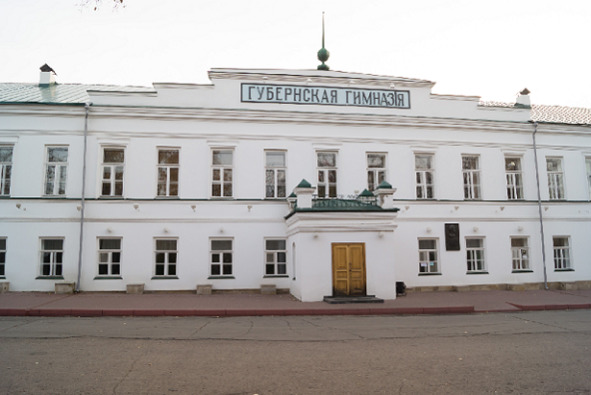
In 1879—1887, the future Lenin studied at the Simbirsk gymnasium presented in the photograph. He ends his studies with a gold medal. Then Vladimir Ulyanov enters the law faculty of Kazan University. It should be noted that training in gymnasiums and universities of Tsarist Russia is conducted in order to select all free time and energy. Ancient Greek, Latin, two foreign languages, and much, much more are being studied. Ulyanov shows extraordinary successes, as he literally quotes Cicero’s speech against Catiline. Practical knowledge is taught on a residual basis. Students are deprived of the opportunity to frolic, communicate with girls, enjoy life and be somehow grateful for this happiness to the state. At the age of 17, including, under the impression of the execution of his brother, a romantic and essentially non-existent terrorist, Vladimir leaves Christianity. Then he enters the organization “Earth and will.” This group is headed by a certain Lazar Germanovich Bogoraz (from a rabbinical family, nominally a “cross”). There is no relief information about the personality of this extraordinary person, the spiritual father of the “leader of the proletariat”. Christianity becomes for Vladimir only at best, the subject of scientific study. In the last years of his life, Nathan Bogoraz headed the Museum of the History of Religions in Leningrad. It is interesting that after the death of a revolutionary – a potential killer of the monarch, Lenin’s mother is paid a state pension for her deceased husband – 100 rubles. Moreover, Vladimir Ulyanov externally enters the law faculty of the Imperial St. Petersburg University. Such a state of affairs is unthinkable in the country of the victorious Revolution – where the relatives of the repressed are subject to destruction, or at least are affected in their rights. The photograph shows the building of the educational institution where V. Ulyanov studied in 1879—1887.

The house of Joseph Vissarionovich Dzhugashivili, preserved in the Stalin Museum, Gori, Georgia. Modern photography. Birth – December 21 or 18, 1978, Gori, Tiflis Province of the Russian Empire. Father – Vissarion (Beso) Dzhugashvili, a shoemaker by profession. A certain national group is engaged in this craft in Georgia. The surname “Dzhugashvili” literally means “the son of a Jew.” The term “juga” means the essence of “iron sold by a Jew”, or simply “Gorsky Jew”. The name “Joseph” is also definitely running Semitic. Rumors are widespread that Stalin’s parent number two is a researcher from Eastern countries, a Russian officer, Nikolai Przhevalsky. But, an insightful reader need only look at the photo of Vissarion to see the family affinity. The photo of Vissarion-Beso is not given in the book due to its negative effect. The mother of the future leader of nations is Yekaterina Georgievna… a laundress, an embroideress, house attendants. Actually, since Catherine (Keke) is not Jewish, then, according to the provisions of the Torah, her son cannot be considered a full-fledged Jew. Some time Dzhugashvili Jr. suffers from beatings in the family, is found with the company of hooligans. Then the teenager is sent to the Gori religious school. After graduating from it, a potential priest passes exams at Tiflis seminary. Song of Time – “Suliko” in Georgian (listen) …“Сулико” на грузинском, слушать
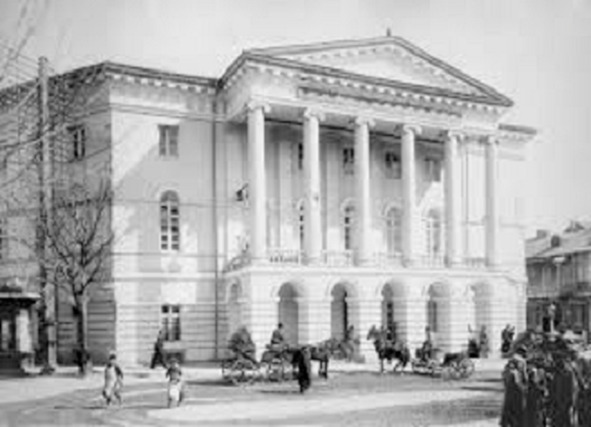
Tiflis (Tbilisi) Theological Seminary, the beginning of the twentieth century. Now it is a museum of art history. Much later, Joseph Stalin himself testifies in an interview with the German writer Emil Ludwig: “Out of protest against the mocking regime and the Jesuit methods that were in the seminary, I was ready to become and really became a revolutionary, a supporter of Marxism…” Institutions were so bad, or is it the slander of a supporter of Karl Marx? Let us recall in memory the Essays on Bursa, the Russian realist writer Nikolai Pomyalovsky. What happens in a school that prepares spiritual “… A party of about twenty people is going to, and they sneak through the courtyard into the class of parish pupils on November evening. … The parishioner, also sitting in the vestibule, didn’t expect anything., scatter the lean and skorimnye, skits and cuffs. Who beats? For what beats? God knows them and the devil wears them!.. Cry, cry, beating babies! On the desks and under the desks destroyed unhappy young parishioners. It hurts her. In these wild beatings of wickedness committed in the dark, there was, on the one hand, some kind of ridiculous prowess: “Get rid of your shoulder, swing your fist!”, And on the other hand, “Tremble, come, and submit!”. We see something similar in other works by Russian writers, such as the beginning of the “Viy” by N. Gogol (Kiev Seminary) … In the end, despite the desire to see her son as an Orthodox priest, Ekaterina Georgievna takes her son from school
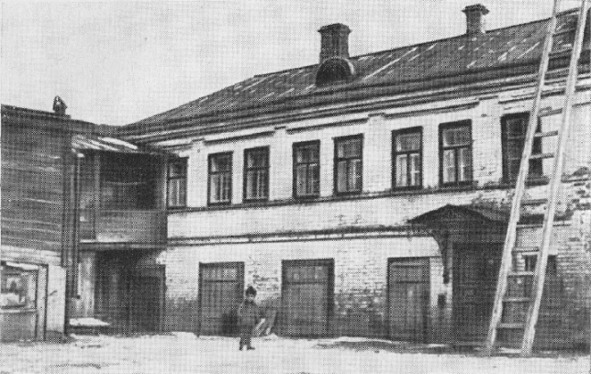
Jacob Sverdlov, also known as Eshua Solomon Movshevich, was born in Nizhny Novgorod on June 3 or 4, 1885. It is interesting that since 1902 the elder brother of Sverdlov became the adopted son of the famous Russian writer Maxim Gorky (Peshkov). Since 1916, for a number of good reasons, Zinovy becomes a French officer, says goodbye to Russia, builds a career, and about his first family, literally: “… he does not want to know anything.” The second brother of Sverdlov, Veniamin, a party functionary, was shot in 1938 by the verdict of the Military Collegium of the USSR Supreme Court as a Trotskyite. Jacob himself, the future “demon of the revolution” ends four classes of the gymnasium, is learning pharmacy business. In 1903, he became a professional revolutionary, a Bolshevik. The photo shows the birthplace of the Sverdlov family, the beginning of the twentieth century.
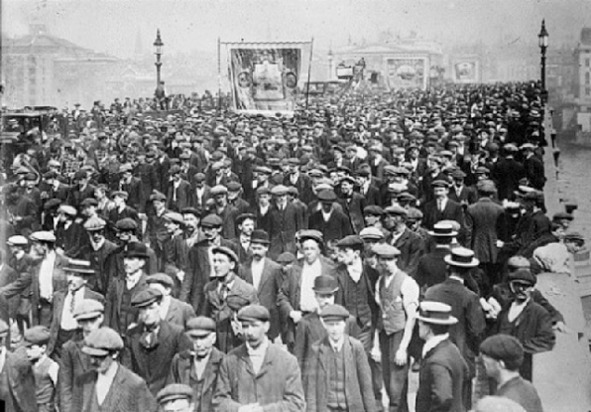
The workers of sunny Australia hold together rallies and, by a distant bright day, on April 21, 1856, seek to reduce the working day from 12 to 8 hours. Wages remain the same. It turns out, by the way, that the country’s economy is a state of affairs in which people spend more money on a cultural and pleasant pastime, is only good. In 1886, the example of overseas colleagues followed by American workers. Called by the Knights of the Order of Labor, one of the workers’ parties, organized according to the principle of the Masonic Lodge, 40,000 protesters take to the streets of Chicago. Police disperse the crowd. Unrest resumes with a new force after the dismissal of thousands of protesters. Police open fire and kill six people. The next day, on the evening of May 4, a bomb flies from the crowd to constables. According to some, this is a police provocation, with the aim of veiling the case of the previous shooting of the protesters. One cop dies. Guards of the order shoot indiscriminately at everything that moves, and kill about forty demonstrators. As a result of the “friend fire”, or including the protesters ‘shots, six policemen are killed. A person with an explosive device can not be established. However, four people are sentenced to death. Such rigidity in relation to people who are not the direct killers of the policeman makes a deep, dual impression on society. By and large, simple American workers win. Most of their requirements, rather sooner than later, are met. However, such overtly extremist appeals as “Destroy the animals in human form, calling themselves authorities! A merciless death to them!”, Representatives of workers’ organizations no longer spread. In 1889, the First Paris Congress of the Second International decided to hold demonstrations on May 1 of each year. The Day of International Solidarity of Workers is celebrated annually in 142 countries of the world. Photography – manifestation on Haymarket Square, Chicago, early May 1886
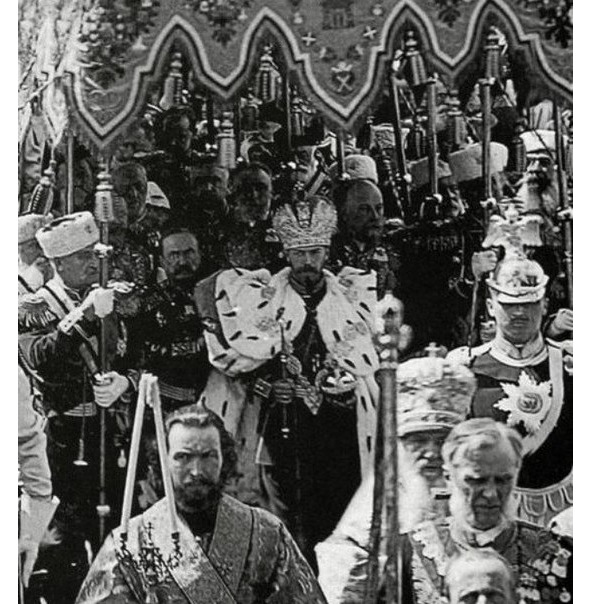
The coronation of Nicholas II Alexandrovich and his wife, Alexandra Feodorovna, will be held on May 26, 1896 in the Assumption Cathedral of the Moscow Kremlin. Before the beginning of the ceremony, Nikolai sits on the throne of Tsar Mikhail Feodorovich (first in the Romanov dynasty), the empress-mother Maria Fedorovna – on the throne of Alexei Mikhailovich Tishayshy (father of Peter the Great), Alexander Fedorovna – on the throne of Grand Duke Ivan the Third (Great). Photography is a solemn procession near the walls of the Assumption Cathedral. A total of 100 million rubles are spent on the coronation of the seemingly immense and indestructible Empire.The new emperor is married to Victoria Alice Elena Louise Beatrice of Hesse-Darmstadt, daughter of the Grand Duke of Hesse (German Empire) Ludwig the Fourth and Duchess Alice, daughter of the English Queen Victoria. Wedding and honeymoon occur less than a month after the death of Alexander the Third, November 26, in an atmosphere of mourning and memorial services. Spouses have children – four daughters and, a patient with hemophilia, son Alex. Alexandra’s relationship with the imperial court does not add up. The Empress considers herself infallible, and intolerant to the opinions of others. A born Danish woman, popular in the light of Alexander the Third’s widow, does not like the Germans (who at one time brought a lot of suffering to her historic homeland). This feeling extends to the sister-in-law. At one time, he did not approve of the fascination with the German and the emperor-father. Nicholas insisted on choosing, threatening to abdicate the throne and accept the monastic rank. Nevertheless, having become a monarch, and not a monk, the young emperor points out about the “inadmissibility of senseless dreams of the fate of representatives of zemstvos in the affairs of internal administration.” Speech “anointed” is accompanied by applause. But this performance becomes the benchmark for the rise of general discontent.

На фотографии – Ходынское поле перед началом празднованияAfter 4 days, May 30, solemn events are organized on the Khodynka field. For the people prepared gifts. Gingerbread cookies, a pound bun, sweets, 200 g of sausage, nuts, raisins, prunes and a porcelain cup are wrapped in a calico scarf. At five o’clock in the morning on the field of one square kilometer from 500 thousand to 1 000 000 people gather. A rumor is rolling that the bartenders are handing out gifts to “only their own.” The people rush to the wooden buildings, 1,800 police officers are unable to contain them. The direction of flow is along the ravine and pits left over from the dismantled pavilions. People fall into the hollows, all new human waves roll over them. The death toll, according to official data – 1383 people, according to unofficial – 4000. In addition, about one and a half thousand are injured and mutilated. By noon, the crash site is cleared of traces of drama. At two o’clock Nicholas II arrives, he is met by new crowds and sounds of the orchestra. In the evening, the festivities continue in the Kremlin Palace. Then the crowned spouses dance at the ball of the French ambassador. For reasons of the king, although the Khodyn catastrophe is the greatest misfortune, it should not darken the bright celebration of the coronation. Entry in the diary of Nicholas II; “I found out about this at 10 1/2 am before the Vannovsky report; disgusting impression left of this news. … Going around the tables, we left for the Kremlin. … Let’s go to the ball to Montebello. It was very nicely arranged, but the heat was unbearable.” On the photo – Khodynskoe field before the start of the celebration
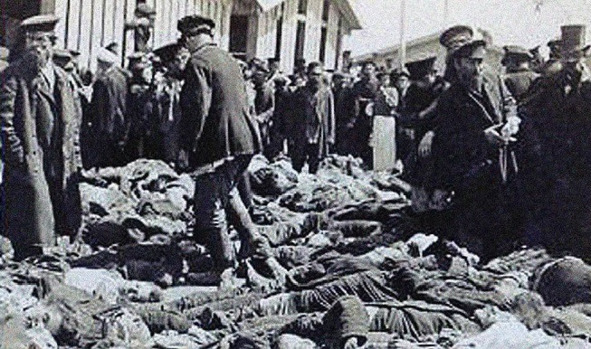
The imperial family donates 90,000 rubles to the victims and 1000 left after all the banquets, bottles of Madeira. The principle of building a relationship of the royal family with the people will be presented from the correspondence of Alexandra Feodorovna with her grandmother, the British Queen Victoria. Victoria: “I rule for more than 50 years, and, nevertheless, I have to think every single day about what I need to do in order to preserve the love of my subjects and make it stronger… Your main duty is to win their love and respect.” Alexandra Alice: “You’re mistaken, dear grandmother. Russia is not England. Here we have nothing to do to deserve the people’s love. The Russian people worship their king as a divine creation. “Photography – victims of the crush on Khodynka. To the beat of time – on the search bar the hymn “God Save the Tsar” (listen) …“Боже царя храни”, слушать
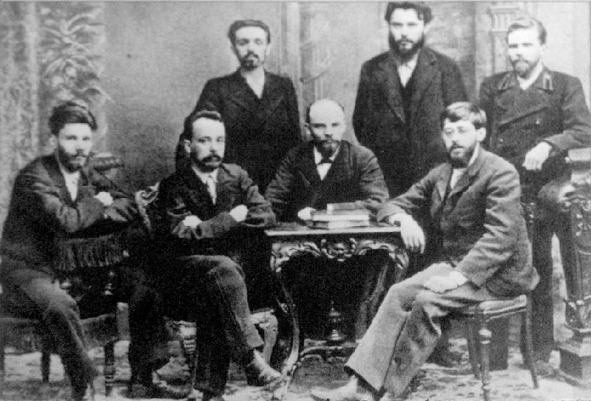
The first congress of the future RSDLP – the Russian Social-Democratic Labor Party will be held in 1898, in Minsk, in the safe house of one of the railway employees. There are 9 delegates from the “Unions of struggle for the liberation of the working class” of several large cities of the Empire, as well as the “General Jewish Workers’ Union in Lithuania, Poland and Russia” (Bund). The congress was initiated by Peter Berngardovich Struve, son of the Astrakhan governor, philosopher and Marxist. If it is interesting to you, in 1918, with the beginning of the Red Terror P. Struve leaves Russia across the Finnish border. In emigration, he censured the tsarist government with foaming at the mouth for the gentleness he showed towards revolutionaries. Lower row, from left to right: V. Starkov, the future trade representative of the USSR in Berlin, G. Krzhizhanovsky, compiler of the Electrification Plan of Russia (GOERLO), Deputy Commissar of Education, V. Ulyanov and Y. Martov (Tsederbaum). The latter, since 1918, has sharply criticized the Bolshevik leadership for its lack of democracy and cruelty, and condemns the shooting of the royal family. Tribesmen to criticism did not react. In 1920, terminally ill with tuberculosis, Julius Martov moved to Germany
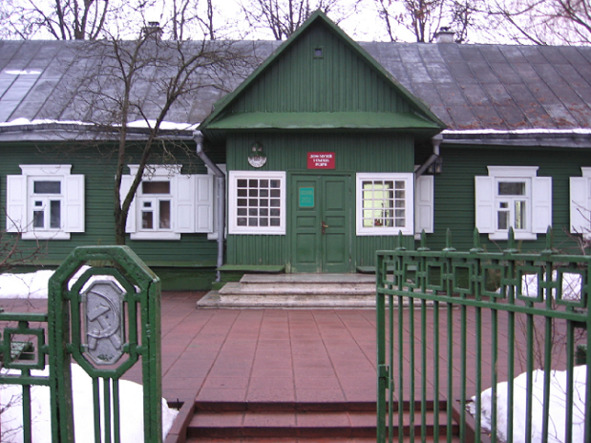
Photography is the home of Pavel Rumyantsev, a railway worker who sympathizes with the revolutionaries. This one, presumably, a fairly well-off worker, does not participate in the meetings. Meetings are held under the guise of celebrating the birthday of his wife Rumyantsev, Olga. The establishment of the RSDLP is already celebrated with a festive dinner – with libations, toasts and songs. The manifesto of the new party says: “Both the movement and the socialist direction, the Russian Social-Democratic Party continues the work and traditions of the entire preceding revolutionary movement in Russia; setting the most important of the immediate tasks of the party in its whole – the conquest of political freedom, social democracy goes to the goal, clearly outlined by the glorious leaders of the old “People’s Will”. But the means and ways that social democracy chooses are different. Their choice is determined by the fact that it consciously wants to be and remains a class movement of organized working masses. She is firmly convinced that “the emancipation of the working class can only be his own business,” and will consistently align all his actions with this basic principle of international social democracy. Long live the Russian, long live the international social democracy! “Comrades, to tune in to the wave of time – the Internationale (listen). I ask everyone to stand up. … Another couple of glasses and, suppose, the host of the house, Pavel Rumyantsev, timidly approaches the festive table. “Tell me, honestly, for whom are you doing all this? Do you really love us, the workers? Can I sit next to you?”
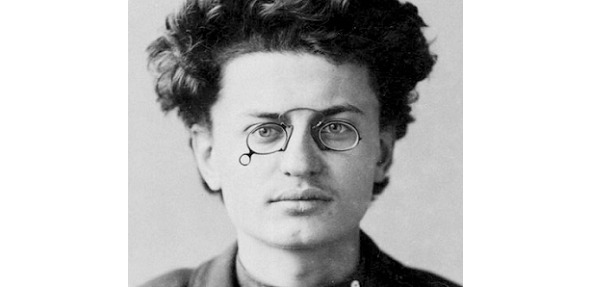
Lev Davidovich Trotsky (Bronstein), the future world-famous revolutionary, Lenin’s ally, the founder of the Red Army. Birth – 1879, November 7, the village of Yanovka, Kherson Province. Information about any profession Bronstein, practical, working activities, no. At the end of school education (Nikolaev), Trotsky, outside of any work experience, declares himself a friend of the proletariat, a professional revolutionary. Now, when Ulyanov-Lenin speaks at the First Congress of the RSDLP, he is 19 years old. Leib Bronstein is busy reviving the South Russian Workers’ Union. Soon he will be sent to Siberia for four years. The royal link is not a gulag. Soon enough, Trotsky escapes, not protected by guards and rows of barbed wire. In Europe – Vienna, London, articles written by Bronstein during his wanderings around Siberia have already gained popularity. Revolutionary becomes one of the editors of the newspaper Iskra
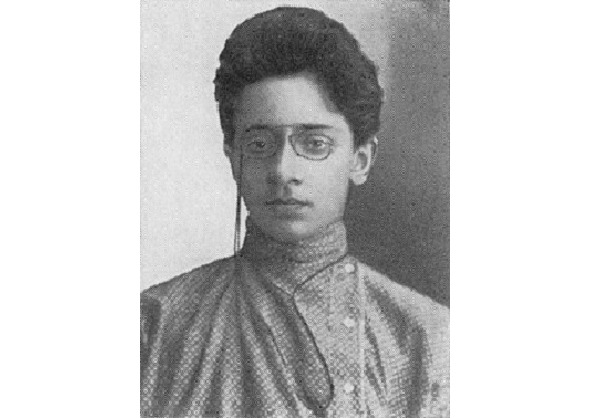
Jacob Sverdlov (Eshua Solomon Movshevich). Persistently scribbling on the violin, communicating among themselves in the spirit of the Torah, regularly, and attending the synagogue on their own, the Jewish boys have an advantage over the boys of all other religious denominations of Russia in organizing their own destiny. In this photo, our hero is 29 years old. By the time of the first congress of the RSDLP, Jacob is 23 years old. The first task from the party is the leadership of the Urals and, note, the Ekaterininburg committees of the RSDLP (b). The largest Motovilikha cannon factory in the country is enveloped in a fiery revolutionary spirit. One of his employees, Gabriel Myasnikov, will later become the murderer of the last de jure Russian emperor, Mikhail Romanov.

